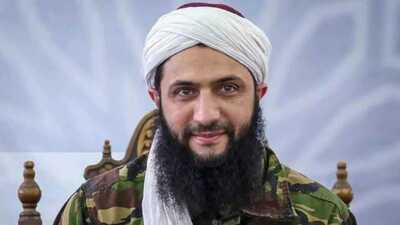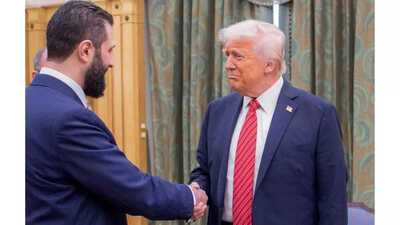Syrian President Ahmad Hussein al-Sharaa, also known by his former nom de guerre Abu Mohammad al-Julani, arrived in New York to attend the United Nations General Assembly, marking the first visit of a Syrian president to the gathering in nearly six decades. Ahmad Hussein al-Sharaa, also known by his nom de guerre Abu Mohammad al-Julani, is the current president of Syria and a figure whose rise to power has drawn global attention.
Born in Riyadh, Saudi Arabia, in 1982 to a Syrian Sunni family, al-Sharaa spent his early years in Damascus. His path to the presidency is extraordinary: from fighting in the Iraqi insurgency as part of al-Qaeda in Iraq, spending five years in US custody, and later founding the al-Nusra Front in Syria, to leading the Hay’at Tahrir al-Sham (HTS) coalition that toppled Bashar al-Assad in late 2024. His visit to the United Nations marks a historic return of a Syrian president to the General Assembly after nearly six decades.
Al-Qaeda and the 9/11 connection: The United States’ engagement with Syrian President Ahmad al-Sharaa
President Ahmad al-Sharaa has attracted significant criticism, given his past as a militant leader. Al-Sharaa, formerly head of Hay’at Tahrir al-Sham (HTS), an organisation once affiliated with al-Qaeda, was previously subject to a $10 million U.S. bounty. His recent removal from the US terrorist designation list and subsequent diplomatic recognition have raised concerns among experts and policymakers, who argue that strategic interests may be taking precedence over America’s commitment to counterterrorism. Critics warn that engaging with a former extremist could send a troubling signal to other groups with similar ideologies.

Furthermore, doubts remain over whether HTS’s rebranding represents a genuine ideological shift or a tactical manoeuvre, particularly in light of the group’s history of human rights abuses and obstruction of humanitarian aid. While the U.S. presents its approach as part of a broader strategy to stabilise Syria and counter Russian influence, the decision has reignited debates over balancing pragmatism with ethical principles in foreign policy. International observers continue to scrutinise the long-term implications for regional stability and global counterterrorism efforts.
Ahmad al-Sharaa’s early militant links
Before his political ascent, al-Sharaa was involved with al-Qaeda in Iraq, part of the global jihadist network responsible for the September 11, 2001 attacks in the United States. While al-Sharaa was not directly involved in planning or executing 9/11, his leadership of al-Qaeda-affiliated groups in Iraq and later Syria tied him to the same extremist ideology and operational networks. Following his capture in 2006 and release in 2011, he founded the al-Nusra Front, al-Qaeda’s Syrian affiliate, to combat the Assad regime. In 2016, he distanced the group from al-Qaeda and rebranded it as a more nationalist entity. Despite these efforts to shift away from transnational jihadism, his past affiliations continue to shape international perceptions of his government.
In a significant policy shift, the US delisted HTS and al-Sharaa from its terrorist designation list in July 2025. This move was part of a broader strategy to engage with Syria's new leadership and support its stabilization efforts. President Donald Trump met with al-Sharaa in May 2025, signaling a thaw in relations. Subsequently, the US lifted many sanctions imposed during Assad's rule, aiming to facilitate Syria's reconstruction and encourage regional stability.

The US engagement with al-Sharaa reflects broader strategic interests in the Middle East. By supporting Syria's transition, the US aims to counterbalance Russian influence in the region. Russia has been a staunch ally of the Assad regime, and its military presence in Syria has been a point of contention. The US support for al-Sharaa's government serves as a countermeasure to Russian influence, aligning with American objectives of promoting democratic governance and stability in the region.
Domestic challenges: sectarian tensions and governance
Despite international support, al-Sharaa's government faces significant internal challenges. Sectarian violence, particularly targeting minority communities such as the Druze and Alawites, threatens national unity. Kurdish forces in the northeast and Druze communities in the south continue resisting state integration and demand greater autonomy. Al-Sharaa has opposed federalism, advocating for a unified Syria, but growing calls for decentralization indicate a complex path ahead for national reconciliation.
Al-Sharaa’s attendance at the UN General Assembly highlights a pivotal moment in Syria’s post-conflict trajectory. While his past as a militant Islamist continues to influence international perceptions, his current diplomatic engagements illustrate a pragmatic approach to governance. How the US and other world powers balance strategic interests with concerns over his extremist history will remain a critical aspect of Syria’s political future.
Born in Riyadh, Saudi Arabia, in 1982 to a Syrian Sunni family, al-Sharaa spent his early years in Damascus. His path to the presidency is extraordinary: from fighting in the Iraqi insurgency as part of al-Qaeda in Iraq, spending five years in US custody, and later founding the al-Nusra Front in Syria, to leading the Hay’at Tahrir al-Sham (HTS) coalition that toppled Bashar al-Assad in late 2024. His visit to the United Nations marks a historic return of a Syrian president to the General Assembly after nearly six decades.
Al-Qaeda and the 9/11 connection: The United States’ engagement with Syrian President Ahmad al-Sharaa
President Ahmad al-Sharaa has attracted significant criticism, given his past as a militant leader. Al-Sharaa, formerly head of Hay’at Tahrir al-Sham (HTS), an organisation once affiliated with al-Qaeda, was previously subject to a $10 million U.S. bounty. His recent removal from the US terrorist designation list and subsequent diplomatic recognition have raised concerns among experts and policymakers, who argue that strategic interests may be taking precedence over America’s commitment to counterterrorism. Critics warn that engaging with a former extremist could send a troubling signal to other groups with similar ideologies.
Furthermore, doubts remain over whether HTS’s rebranding represents a genuine ideological shift or a tactical manoeuvre, particularly in light of the group’s history of human rights abuses and obstruction of humanitarian aid. While the U.S. presents its approach as part of a broader strategy to stabilise Syria and counter Russian influence, the decision has reignited debates over balancing pragmatism with ethical principles in foreign policy. International observers continue to scrutinise the long-term implications for regional stability and global counterterrorism efforts.
#BreakingNews
— Bharat Spectrum (@BharatSpectrum) September 22, 2025
America's former wanted terrorist and current Syrian President Ahmad Al Shara is on a visit to the USA!
This is happening after many years. The last time a terrorist reached America by plane was on 9/11. pic.twitter.com/zsbgfZQOk6
Ahmad al-Sharaa’s early militant links
Before his political ascent, al-Sharaa was involved with al-Qaeda in Iraq, part of the global jihadist network responsible for the September 11, 2001 attacks in the United States. While al-Sharaa was not directly involved in planning or executing 9/11, his leadership of al-Qaeda-affiliated groups in Iraq and later Syria tied him to the same extremist ideology and operational networks. Following his capture in 2006 and release in 2011, he founded the al-Nusra Front, al-Qaeda’s Syrian affiliate, to combat the Assad regime. In 2016, he distanced the group from al-Qaeda and rebranded it as a more nationalist entity. Despite these efforts to shift away from transnational jihadism, his past affiliations continue to shape international perceptions of his government.
Al Sharaa, former Al Qaeda, arrives in New York, site of the 9/11 terror attacks, to attend the UN meet a mere 5 km from where the Twin Towers stood. Wild trajectory, if there ever was one... https://t.co/ypYyNVjwZ0
— Kabir Taneja (@KabirTaneja) September 22, 2025
In a significant policy shift, the US delisted HTS and al-Sharaa from its terrorist designation list in July 2025. This move was part of a broader strategy to engage with Syria's new leadership and support its stabilization efforts. President Donald Trump met with al-Sharaa in May 2025, signaling a thaw in relations. Subsequently, the US lifted many sanctions imposed during Assad's rule, aiming to facilitate Syria's reconstruction and encourage regional stability.
The US engagement with al-Sharaa reflects broader strategic interests in the Middle East. By supporting Syria's transition, the US aims to counterbalance Russian influence in the region. Russia has been a staunch ally of the Assad regime, and its military presence in Syria has been a point of contention. The US support for al-Sharaa's government serves as a countermeasure to Russian influence, aligning with American objectives of promoting democratic governance and stability in the region.
Domestic challenges: sectarian tensions and governance
Despite international support, al-Sharaa's government faces significant internal challenges. Sectarian violence, particularly targeting minority communities such as the Druze and Alawites, threatens national unity. Kurdish forces in the northeast and Druze communities in the south continue resisting state integration and demand greater autonomy. Al-Sharaa has opposed federalism, advocating for a unified Syria, but growing calls for decentralization indicate a complex path ahead for national reconciliation.
Al-Sharaa’s attendance at the UN General Assembly highlights a pivotal moment in Syria’s post-conflict trajectory. While his past as a militant Islamist continues to influence international perceptions, his current diplomatic engagements illustrate a pragmatic approach to governance. How the US and other world powers balance strategic interests with concerns over his extremist history will remain a critical aspect of Syria’s political future.
You may also like

Major airport shut down as planes forced to divert amid 'large' drone incident

Prince Harry is 'asking for trouble' with latest update, expert slams

Victoria Coren reveals bizarre criticism she received over Only Connect

Ballon d'Or 2025 winner crowned as Mo Salah and Lamine Yamal snubbed

Comedian Matt Rife fumes at airline as he is kicked out of first class seat






